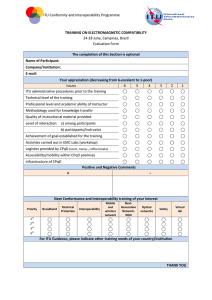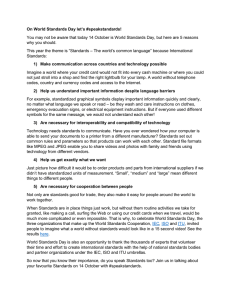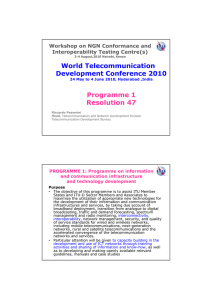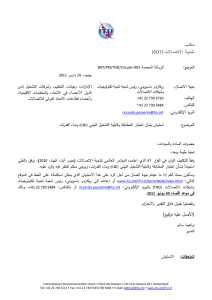The “CASCO Toolbox” relationships… Highlights from consultation events for the Americas and
advertisement
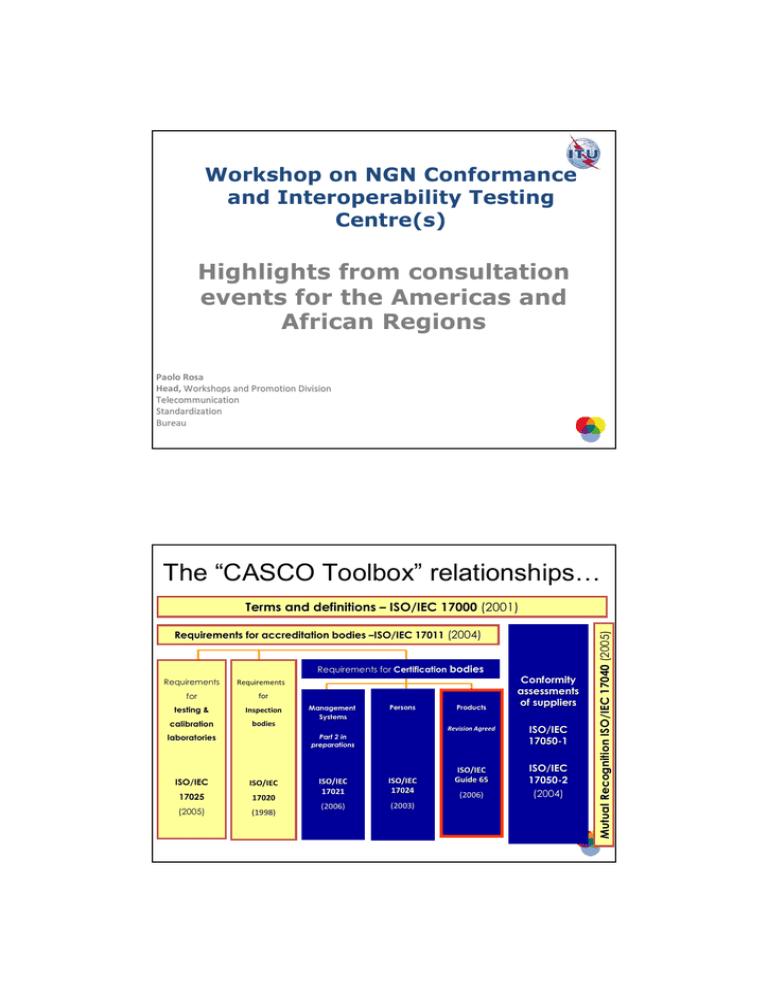
Workshop on NGN Conformance and Interoperability Testing Centre(s) Highlights from consultation events for the Americas and African Regions Paolo Rosa Head, Workshops and Promotion Division Telecommunication Standardization Bureau The “CASCO Toolbox” relationships… Requirements for accreditation bodies –ISO/IEC 17011 (2004) Requirements for Certification bodies Requirements Requirements for for testing & Inspection calibration bodies Persons Products Revision Agreed ISO/IEC 1705017050-1 ISO/IEC Guide 65 ISO/IEC 1705017050-2 (2004) Part 2 in preparations laboratories ISO/IEC ISO/IEC 17025 17020 (2005) Management Systems (1998) ISO/IEC 17021 ISO/IEC 17024 (2006) (2003) Conformity assessments of suppliers (2006) Mutual Recognition ISO/IEC 17040 (2005) Terms and definitions – ISO/IEC 17000 (2001) Impact of the Mutual Recognition Agreement in the Americas Lack of certified laboratories and of policies for their accreditation did not allow, especially in the countries of latin america and of the caribean islands, the achievement of the objectives of MRAs, and it generated a disparity in the access to the market in the american region. La falta de laboratorios certificados y de políticas de acreditación de los mismos en especial en los países de América Latina e islas del Caribe, no ha permitido que los objetivos se cumplan para todos los países, lo que ha generado una disparidad en el acceso a los mercados de la región de las Américas, CPqD: Technological Services Software Development Business Intelligence Solutions Consulting Services in Information Security, IT Governance and Elaboration of PDTI (Industry and technology development program) Business Process Reorganization Telecom Resource Management Power Resource Management Laboratory Services: Calibration Laboratory Tests Product Certification Tests 700 tests accredited by (CGCRE/Inmetro) Measurements: Optical and Wireless Power System Monitoring System ATIS Conformance Database Is Ineffective and Risky - 1 • A conformance database is not likely to improve interoperability. – Conformance is not necessarily related to interoperability. For example, whether a product conforms with product safety requirements does not impact its ability to interoperate with other devices. – Most products conform to many standards, not just ITU Recommendations. Hence, conformance with only ITU Recommendations will not ensure interoperability. – The majority of standards include many options. If a standard has two options, for example, products in conformance with Option A will not necessarily interoperate with products in conformance with Option B. ATIS Conformance Database Is Ineffective and Risky - 2 • The database could negatively impact countries and consumers. – Countries may be deprived of new, state-of-the art products and services if companies are inhibited from entering a market when its products are not listed in the database. – Time-to-market will likely be slowed by new conformance testing. – Marketplace confusion could result from false, misleading or otherwise erroneous database entries. • Consumers may face higher costs from additional conformance and/or interoperability testing and from reduced competition in the market. ATIS supporting CITEL step-by-step approach proposal to Plenipotentiary 2010 “The Telecommunication Standardization Bureau (TSB) Director, prior to the implementation of any conformance or interoperability database, should: • Identify the nature of the interoperability and conformity problems in the CITEL region; • Study the effects databases may have on sector members and stakeholders (e.g., other SDOs); – Proposed studies should also address relevance of the proposed searchable databases in “bridging the standardization gap” in the Americas Region; • Present the results of a robust consultative process with respect to the databases to future Council meetings; • Develop a detailed “business case” for the searchable database prior to its implementation; and • Address potential liability issues related to the use of the databases by the TSB Director before implementation.” TELCOR-NICARAGUA Problems: • • • • • • Hardware & Software Partial non conformity for expected functionalities Out of service Signaling Safety requirements Overhead configuration Effects on: • • • • • • Cost increase to the need to replace some existing equipment or to buy additional equipment to solve problems Negative impacts on customers Negative image with respect to competitors Limited or no access to required services Delay in restoring Impact on effectiveness of services for civil society and emergency (for example public phones could not handle a three-digit numbering, wich are the emergency numbers Conclusion: • We support all procedures that ITU is developing to carry out excellent conformance and interoperability of telecommunications systems. • We believe that in developing countries should avoid these problems, affecting both operators and end users and the application of Resolution 76 of the ITU is a way to avoid many problems if we apply it immediately. • Compliance testing and interoprabilidad and database are indespensible tools to achieve our objectives. CITEL -MRAs Step I: Mutual recognition of test results País importador País exportador Fabricación Pruebas Exportación Certificación Comercialización Step II: Mutual recognition of the Certification País importador País exportador Fabricación Pruebas Certificación Exportación Comercialización Certification and Accreditation Protocol Specifications, Testing Methodology, Test Specifications Standards Product Supplier Implementation Testing Manufacturer’s Test Operations Accredited 3rd-Party Test Laboratory ISO/IEC 17025 Test Report, X.290 Compliant Accredited 1st-Party Test Laboratory (Best Practice) Test Laboratory ISO/IEC 17025 Test Report, X.290 Compliant Test Report Accredited Certification Body Certificate of Conformance Customer • Supplier’s Declaration (ISO/IEC 17050-1) Customer Supplier’s Declaration International Customer Telecommunication Union Base Ground: Customer would be happy with an accredited certificate of conformance. Nairobi, Kenya, 30 – 31 July 2010 10 Accreditation • Incremental costs added, but more long-term confidence in the products. • Confidence in technology is more important than how quickly it appears in the market. • National implementation should adhere to accredited certifications requirement to have level playing ground for all vendors. • Flourishing testing and accreditation businesses will lead to better affordable economics to all players. 11 Declaration of I/Op Tests Results • Test events are very helpful, however: – Balance transparency vs confidentiality regarding Interoperability test results. – At least Test Environment and equipment Configuration should be declared. – ITU role is vital in this regard. e.g. repository for the results; DC practical capacity building to be involved in Interop testing. Communications Architecture for FIFA 2010 high level model Telkom Current & NGN Services Networks utilised for standard Communication Services Voice Fax Internet Voicemail Telkom Services and IP Networks Hotel, Press Office, Media Centre,… Video Conferencing Call Forwarding IBC International … Redundant Fibre Connectivity Redundant Fibre Connectivity Backup Wireless Connectivity Backup Wireless Connectivity Redundant Fibre Connectivity Backup Wireless Connectivity Telkom Transport Network Stadium High Definition Contribution Video Dedicated DWDM Infrastructure utilised for Video Distribution TE DATA – Egypt - SNMP • ATM DSLAM (Vendor-X) not supporting the standard an complete MIB tree; causing poor discovery and management through the SNMP servers • Impact: Hard to provision and to operate through management servers Added operational costs and resources 14 TE DATA Recommendations • Operators should share their experience and knowledge regarding interoperability through standard bodies. • ITU and Standard Bodies should make a program to enhance operator skills regarding standards in technology. 15 TE DATA Recommendations • Local and international standard bodies help in establishing and accrediting regional LABs. • Monthly Bulletin by local countries NTRA with vendors’ problems and actions • Hardware and software suppliers should mention the certificates of the products regarding the introduced features and its interoperability with other suppliers. 16 Mobinil - Situation Today • Low conformance to standards generates conflicts between operators and vendors especially when affecting customer experience 17 NSN - Interoperability Verification Projects Experiences from developing countries • Nokia Siemens Networks has run several successful multivendor projects in developing countries; • Nigeria, South Africa, Tanzania,… • Projects cover infrastructure for several technologies, GSM/GPRS, WCDMA and for both Core Network and Radio Network Elements • Multivendor verification project duration is usually one to some weeks per interface depending on interface and test scope – No blocking issues have been reported • Interoperability, conformity and standards are good – Configuring the network is a key activity in the project • A task that must be done in every project anyway • No differences compared to projects in developed countries NSN-Two Categories of “Interoperability Issues” 1) Problems appearing as “interoperability issues” (i.e. occur in single vendor environment too) • Many times wrongly perceived as “interoperability issues”, typically due to: • Invalid Configuration of network • Inadequate System Testing (Conformance, Functionality, Performance,…) 2) Real “interoperability issues” (i.e. occur only multivendor environment) • Protocol conformance is usually high, issues arise mostly due to: • Different options allowed by specifications • Incomplete and/or ambiguous specifications • Invalid Configuration of network • Category 1) represent many times majority of issues in a multivendor project resulting in a false perception that interoperability is poor. – The correct conclusion is in many cases: • System not properly configured and parameterized and/or Product Quality is poor Contributions received so far IEEE Conformity Assessment Program: The Website • The ICAP website (www.ieee-isto.org/icap) is the externally facing “storefront” for the ICAP program • Providing a home base for industry groups involved with conformity programs associated with IEEE standards – Includes Laboratory Services Listing – Includes Registry of Conforming Products Italy Example in SDH homologation (Gov. labs): • • • • 6 Manufacturers – STM 16 Optical Systems Physical Interfaces Software & Hardware 107 tests failed: no-conformance and no-interoperability, e.g.: – – – – – – BER performance, data exchange and thresholds settings Protection switching Alarm monitoring not correctly implemented (threshold etc.) especially for regenerators and for STM-1, STM-4 and STM-16 levels AIS (signal loss alarm) actions not implemented receiver sensitivity versus a BER=10-10 for the ADM16/1 aggregate optical interface results not compliant with ITU-T G.957 Recommendation; No conformity to standards for • • • • • • • Jitter transfer function on PDH tributaries at 140 M bit/s out of Recs. EOW auxiliary (service) 1+1 protection switching, absence of error performance monitoring (ITU-T G.821 and/or G.826) Frame alignment pointer not in common positions (Bytes, Bits) synchronization/clock problems …. National Communications Authority Ghana National Communications Authority Ghana Equipment Category Description of Problem NTP Routing Signaling Main Reasons Poor interop equipment different vendors Optical Interface QoS: low Quality of Service – BER related issues Poor interop equipment different vendors Effect Impact / Cost increase to replace old / buy new equipment Cost increase to replace old / buy new equipment Vietnam • Partial missing of vendor’s committed implemented functionalities affects general quality of services – – • In mobile wireless network, it was not possible to implement vendor A’s EMR function In transmission network, vendor B’s SDH equipment Metro 100 lacks of LCAS (Link Capacity Adjustment Scheme) functions…. Partial lack of interoperability between equipment of same or different manufacturers results in the impossibility to access to services – – when exchanging codecs between 2 softswitches, the first priority of supplier F’ MSS equipment is AMR 12.2 while AMR 12.2 is the secondary choice of supplier E’s MSS, thus, the supplier E’s MSS only replies with the G.711 message. A interface of supplier E‘s BSC support only ATM while the MSS equipment of supplier F support only TDM • Need to apply unexpected procedures to obtain that functionalities work • Low quality of service – – many service providers/operators could not figure out the specifications that are related to the QoS of each service, thus their compatibility or incompatibility to ITU recommendations such as ITU-T G.1010, ITU-T E.860… still can not be verified. QoS has not been realized in details, therefore it is not easy to apply ITU-T’s recommendations. Summary • • • • • • • • Conformity and Interoperability according to international standards: the participants agreed that C&I is the key parameter for the deployment of networks and services to meet the requirements of end users. Address concerns: explicit concerns for lack of conformity and of interoperability and the effects on operators and end users were expressed from Nicaragua that fully supported the ITU C&I program and DB Examples of lack of conformity: examples of non-conformity and noninteroperability as shown in some contributions received were also highlighted by TSB for completeness of information to participants Labs: Some presentations dealt with testing and facilities available in the region also showing the 'ANATEL Mark, ID and Bar Code' programs ATIS was not question the need for C&I. However they plainly stated that the 'CITEL's suggestions to Plenipot 2010 of a step-by-step approach' is hugely preferable. CITEL-OAS MRA approach: the participants recognized the validity of the as a tool to facilitate, among others, trade without the need to repeat testing, able to reduce the time-to-market thanks to established “certified” testing procedures. ITU Conformity Database: TSB demonstrated the existence of conformity databases established by other SDOs but ATIS demonstrated concerns about the database. ATIS representative highlighted how the Res. 76 and 47 are good Resolutions but that a step-by-step approach is necessary before the ITU conformity database be established and that it is necessary to find an agreement to address the respective concerns from end users and industry on this issue. C&I Portal: The ITU C&I program encourages the cooperation between SDOs to link similar databases each other, off line discussions also proposed the creation of an ITU C&I Portal for the interested stakeholders Conclusions-2 •Strong support from Dev Countries for the immediate implementation of the Conformity DB and the creation of Interoperability DB to be linked to other similar databases • ITU-T SGs to look for other available Databases •Concerns from vendors on the design of the DB and encourage them to improve the design before to make it public as one of the tools of the C&I program •African countries + ATU to individuate locations for test centres in the region / sub region (NESW) Conclusions-2 • Need of active participation of Africa in the ITU-T SGs to improve Recommendations. Fellowship & remote participation available. • Need of Operators from Africa to participate in the work of ITU-T to learn more about standards and how to implement them •PP-10 will analiozse a proposal for participation at reduced fee for members from Dev Countries •The step by step approach should not slow down the implementation of action lines of council-09 and a proposal for a parallel approach has been presented by TSB •Importance of the participation of association of consumers •Capacity Building: Tutorial in Rwanda on Optical fibers THANK YOU Paolo Rosa Head, Workshops and Promotion Division Telecommunication Standardization Bureau paolo.rosa@itu.int
